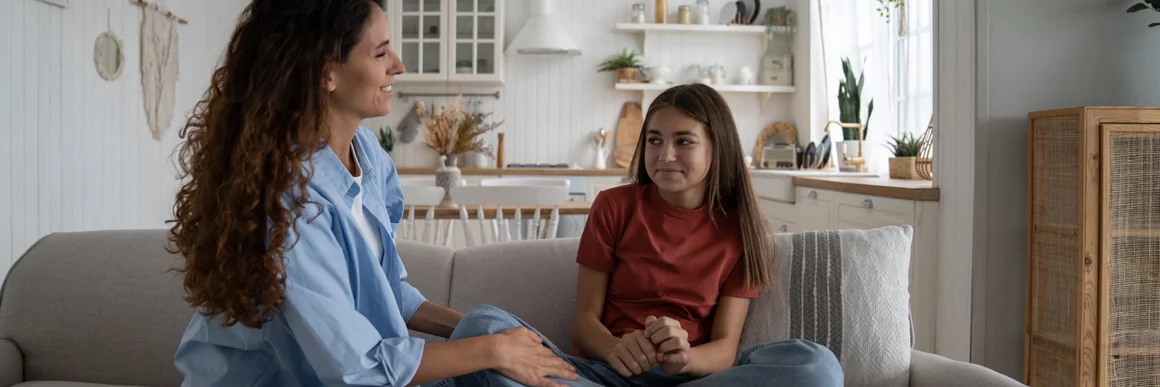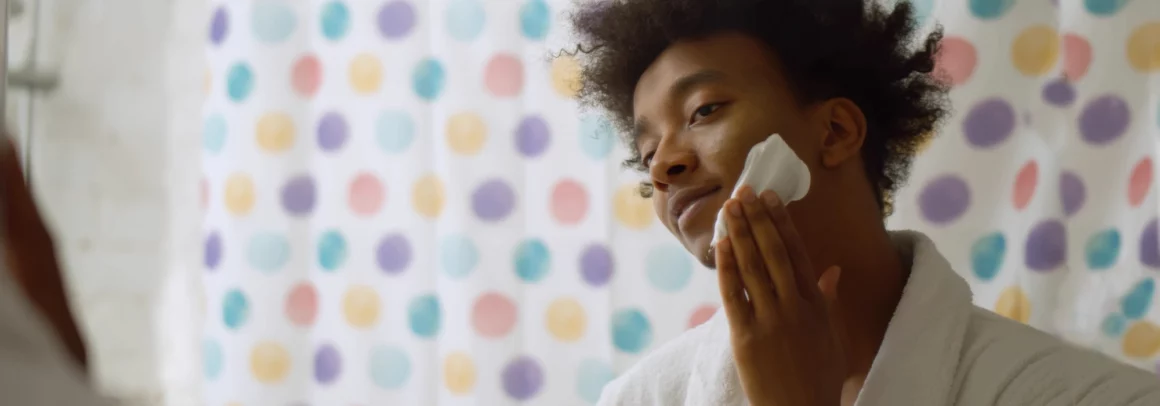When to start the menstruation conversation, what to say, and what to do if you need help — period.
Author Jen Bell | Reviewed by Staci Tanouye, M.D.
Starting a first period marks a huge transition, both physically and psychologically. Menstruation might feel shrouded in mystery for you preteen or teen, and it’s your job to demystify the experience — what’s happening inside the body, what having a period might feel like, what to expect in terms of blood flow — as much as possible.
Here’s our best expert advice on how to navigate talking with your preteen about their first period.
HEADS UP > Though we use the term “daughter” above, we will use they/them pronouns going forward. This guide helps you navigate your preteen or teen’s first period, regardless of their gender identity.
Talking about Periods: When to Have Your Initial Conversation
Think of your first conversation with them as just that: a first talk. You don’t want to overwhelm them with too much information at once or in one sitting. And as they mature and develop, their understanding of the menstrual cycle will mature and develop, too.
It’s important to explain menstruation well before you think they might start puberty. Since periods can start in kids as young as 8 years old — and the age of onset continues to trend downward — you might be broaching the topic earlier than you think, like age 7 or younger.
You’ll want your child to hear about menstruation from you first — instead of their peers or the internet — and you’ll want to give the topic enough time to sink in, so that it’s normalized by the time their period begins.

Where to Have the Menstruation Conversation
Consider starting a conversation when you both have ample time and you’re feeling relaxed and open. (Trying to talk to your pre-teen when they’re stressed over homework, for example, might not lead to the best outcome.) Choose a setting where you feel safe, comfortable, and have privacy, like a long car ride with just the two of you.
If they’re more comfortable communicating over text or through an app — like many preteens and teens — you might consider starting the conversation that way.
Look for Teachable Period Moments
Sometimes the world around you will deliver the perfect opening, and you’ll want to be ready to take the opportunity. Maybe a TV show or movie will spark a conversation; maybe it’s a TikTok or Instagram reel; maybe they’ll share something a friend of theirs is dealing with. These could be things like:
- They see you buying tampons or pads and ask what they’re for.
- They see tampon or pad commercials.
- They hear of someone mentioning cramps or other premenstrual syndrome (PMS) symptoms.
- They see social media campaigns about periods, first period kits, or products.
PRO TIP > Encourage your teen to explore the BLOOM TEEN HUB to learn all about their skin and skin care, written just for them!

What to Talk About During the Period Conversation
Ask What They Know About Periods
This will give you a baseline on what and how much they know about the menstrual cycle, so you can start from whatever information they may have. (And you won’t be met with an eye-rolling response if you start talking about something they’ve already learned!)
How to Explain a Period to Your Child
Introduce the Menstrual Cycle Biological Basics
Walk them through the science of menstruation — what’s actually happening during a period — using anatomically correct words like vagina, ovulation, and uterus. Explain why they have a period and how it’s preparing the body for pregnancy. Let them know that for the first few years, there’s a good chance they will have irregular periods, and that’s normal.
Connect Biology With Physiological and Emotional Experiences
Explain that they might experience PMS and what that might entail — that they might have mild cramps, back pain, or tender breasts, and that heating pads and over-the-counter pain relievers can help. Demonstrate how to use pads and insert a tampon. (If they’re anxious about the process of inserting a tampon, assure them that you’ll help if needed.) Reassure them that periods are not a disease, and that life doesn’t need to stop each time they get their period: They can still play sports, swim, etc.

Ready to elevate your parenting? Become a member of the BLOOM family today!
Gain access to workshops, coaching, and a network of supportive parents. Don’t navigate this journey alone –
Encourage Their Period Questions
Let them know that you are available for any questions. Maybe they want to know when most people start their period. Or, what is considered “heavy bleeding,” or how much menstrual blood is considered “normal.” Or even, how to use a menstrual cup. If they take you up on this, offer straightforward, honest and simple answers.
If you’re struggling with these conversations, check out BLOOM’s Conversation Starters for tips.
Acknowledge Any Conflicting Feelings
They may feel excited about getting their period; they may feel afraid or anxious; or, they may feel confused and conflicted. And these feelings may change daily (or hourly!). Validate whatever they’re willing to share with you. The more curious and nonjudgmental you are, the more comfortable they’ll be expressing any fears.
If you’ve had a period , you might share your experiences — just make sure to acknowledge that all bodies are different. While you’re there to help them navigate (and perhaps celebrate) this transition , their experience might be completely different from yours.
Use Period Positive Language
Avoid calling menstruation “the curse,” using negative or pessimistic language (“periods suck!”) or sharing alarming anecdotes. Often, they’re scared that their period will be overwhelming, and that menstrual blood will rush out uncontrollably. Clarify that a period is different from a bad cut and be straightforward about the amount of actual bleeding — likely around 3-8 tablespoons over the course of several days. (You can pour that amount of fluid into a cup to reassure them.)
If the Period Conversation(s) Don’t Go Well
They might feel embarrassed or shy talking about periods — from pads and tampons to learning about the reason behind vaginal discharge, it’s a lot to take in initially! — or maybe they don’t feel ready to talk about something so personal at all. Even so, it’s likely they have questions. Let them know that you’re always available to talk when they feel ready. Texting might be easier for young people who feel awkward or shy.
If you’re struggling with these talks, your preteen or teen’s doctor can walk you both through puberty and the basics of getting a period.
If you are still feeling overwhelmed, don’t worry! BLOOM is here to help. With our library of On-Demand Workshops with our trusted educators, to our Ask the Expert Forum & Live Events where you can get answers to your burning questions from our qualified professionals, to Supportive Community, where you can find strength in a community of other parents and caregivers, to Direct 1-on-1 Parent Coaching Support, we’ve got you. Raising tweens or teens is hard enough. BLOOM is here to make it a little easier.
